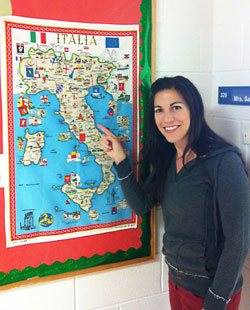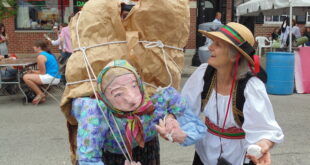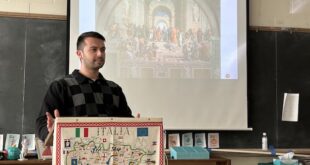
“My father gave me an article he saw in Fra Noi about how the Italian government, along with a non-profit group called Italidea, was giving grants to American schools that started Italian programs,” Sasso recalls. ” I brought the information to my principal and she let me apply for the grant and the next school year, I started the program.”
Since kicking off in 2002, Sasso has grown South’s program from 40 students to 175, making Italian the school’s second most popular language offering. “Our program has had success due to the close relationship we have with our high school programs,” Sasso says. “We have Italian exchange students that visit our school each year. This program is through Prospect High School, and many of my former students have traveled to Italy as a part of their program.” Over Spring Break 2013, some of Sasso’s former students went to Italy with Rolling Meadows High School.
For Sasso, the love of languages dates to her teenage years. At 17, she studied in France for a summer, and then went to visit relatives in Italy, in Le Marche and Abruzzo. “After that visit, I knew I needed to learn Italian,” she recalls.
Sasso attended Georgetown University, where she majored in Italian and minored in French; she studied part of the time in Florence and went to live with her Italian relatives when the program finished.
“I feel so fortunate to be teaching a language I love and a culture that defines me,” Sasso says. “My enthusiasm is evident and that is one of the many reasons students want to take this language.” She also keeps the language alive, and lively, by using different games, activities and technology to engage students.
“The Internet also provides me with authentic cultural information that gives my students current exposure to the culture,” she adds. “We watch TV shows, music videos and YouTube videos so my students are up to date with the language.”
Still, all of this wouldn’t be effective with practice, and lots of it. “Students have to use the language in authentic situations so that they will be prepared when they eventually travel to the country,” Sasso says.
It’s her hope that those middle school students entering their teens will discover with full force the joy and wonder of Italian, just as Sasso did at age 17. “My personal goal is to ignite the desire in my students to continue studying Italian in high school — and eventually visit and experience, “La Dolce Vita,” she says.
 Fra Noi Embrace Your Inner Italian
Fra Noi Embrace Your Inner Italian






